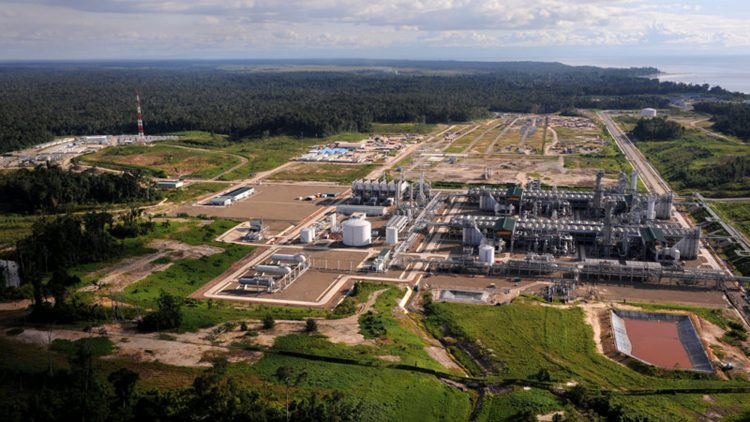
BP will be bracing for a delay in the start-up of its third liquefied natural gas (LNG) train at the Tangguh LNG project in West Papua province, Indonesia, due to the Covid-19 pandemic.
The project already delayed by one year, from the original target completion in 3Q 2020 to 3Q 2021, due to disruption caused by two tsunamis in 2018, now looks set to be delayed further as the workforce building the expansion has been drastically reduced to stem the spread of the coronavirus.
Deputy chairman of operations at Indonesian upstream regulator SKK Migas, Julius Wiratno, told local media that, because of the coronavirus, the project has adopted physical distancing among workers. This triggered a drastic fall in workers on site – from 13,000 people to 10,000 as of the third week of March. This will further be cut to 3,000 core workers only.
The consortium of contractors, which include Chiyoda and Saipem, building the third 3.8 mtpa LNG train, made a decision that they would temporarily stop field work from 15 March due to force majeure, based on the World Health Organization (WHO) declaration of Covid-19 as a global pandemic.
However, analysts at Jakarta-based research firm Tenggara Strategics said the consortium’s decision reportedly angered both SKK Migas and BP as it was not yet clear who would be responsible for the resulting cost overruns. The Tangguh Train 3 expansion project comes under a cost recovery contract, meaning SKK Migas – or the government – would ultimately bear the cost, predicted Tenggara.
The consortium has already sent many workers home and told them not to return to work until they receive official notifications to do so. After the tsunamis of 2018, which delayed deliveries of construction materials to the site, many of the workers were also sent home, but many of them did not want to return to work. Due to the delay following the natural disasters, the engineering procurement construction (EPC) contractors demanded an adjustment to the EPC cost from $2.4 billion to $3.4 billion.
“This time, it is not clear yet how long the coronavirus will delay the project and how much the delay will cost the government,” Tenggara said in its latest report.
Sources told Tenggara that the contractors have asked BP to bear all the additional costs caused by the termination of work. These costs include field worker salaries, accommodation costs, heavy equipment costs, logistics costs and subcontractor fees.
The sources reported that BP has refused to pay all the costs and instead, asked the consortium to continue with the works for Tangguh Train 3. “According to the source, BP wants to avoid further delay in the completion of Tangguh Train 3 project because such a delay would incur costs greater than that having the works terminated,” reported the research firm.
SKK Migas also wants to avoid any cost overrun resulting from work termination to be included under the cost recovery contract. Therefore, after several negotiations, SKK Migas and BP, have requested that the consortium not stop all works and that essential works must continue, reported Tenggara.
When Train 3, initially expected to cost $8 billion before any delays, eventually comes online, the total capacity at Tangguh will be 11.4 mtpa. While LNG from Train 1 and Train 2 is mostly for export, 75% of LNG from Train 3 would be supplied to state utility PLN and the remaining 25% for export to Japan’s Kansai Electric Power Company.
Boosting domestic gas production and exports is one of Indonesia’s many strategies to turn around the country’s widening oil and gas trade deficit that remains a key vulnerability. The deficit hit $1.18 billion in January, up 2.8 times from the previous year, Statistics Indonesia (BPS) data shows.
Aside from BP’s Tangguh Train LNG project, Japan’s Inpex is also planning to develop the 9.5 mtpa Masela LNG export plant. If successful, the two facilities would double Indonesia’s LNG production capacity to 33.1 mtpa by 2027-28.
Still, it looks almost certain that the coronavirus, which appears to be spreading rapidly in the archipelago, will delay the start-up of Tangguh Train 3, particularly as the Indonesian government’s response to the outbreak has been widely criticised.
“The (government) policies, in particular, are perceived as too lax and disproportionate to the stark figures of Covid-19 infections and the mortality rate in Indonesia, the growth of which is among the highest in the world,” said Tengarra.